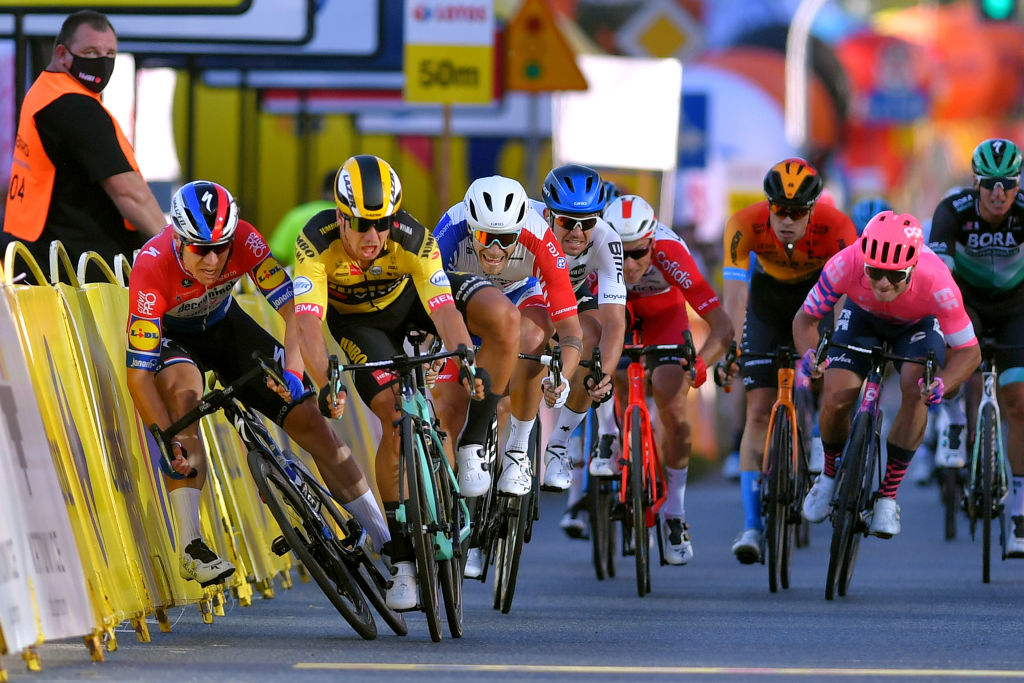Riders to face red card-type punishment for safety, littering violations
Lappartient insists new measures are not petty, re-emphasises UCI focus on safety

The UCI has published an explanation guide to the raft of new safety rules that have and will come into force, with UCI President David Lappartient insisting that the sport's governing body is not obsessed with details or imposing petty fines but is looking at a much bigger picture to improve rider safety.
The UCI and other stakeholders such as the CPA riders association, race organisers and team representatives unanimously approved a wide range of measures to improve rider safety in late January, an initiative that gained steam after the horrific crash of Fabio Jakobsen in the 2020 Tour de Pologne.
The new rules ban the so-called ‘super-tuck’ and other aerodynamic bike positions that don't meet the seat-on-saddle/hands-on-bars regulation, introduce stricter punishment for littering but also oblige race organisers to do more for race safety.
Barriers and routes for race finishes will be redesigned for the 2022 season, with race organisers obliged to nominate a safety officer. The UCI has also hired former pro rider and race organiser Richard Chassot as the central UCI Safety Manager.
The UCI will create a database of crashes to study how and why they occur, and it will take a further look at disc-brake safety, the impact of race radios on safety and even bottle and bottle cage design.
Some riders derided the new rules on social media, arguing they had not been involved in the decision making process and suggesting the ‘super-tuck’ position was not dangerous. However, Matteo Trentin, who attended the series of safety meetings along with Philippe Gilbert and the CPA riders association, revealed that just 20 of 800 riders had opened an email updating them on the safety discussions.
“Our goal is to protect the athletes. I think in a few months everyone will accept it (banning the super-tuck) was the right decision,” Lappartient told Cyclingnews and Wielerflits in an interview on Thursday.
The latest race content, interviews, features, reviews and expert buying guides, direct to your inbox!
"Safety is currently the top priority at the UCI and I don’t say that as a politician. I said in the first meeting in October that we can try to blame each other but I insisted that safety becomes our common goal. We all have to do something to improve safety. That’s the spirit we had in all the meetings and we approved the rules with unanimity.
“I think it’s a major step for safety. Some measures will come into force in the next few weeks, some in the months ahead and other via new technology. I believe we’re working in the right way.”
Lappartient explained why the ‘super-tuck position and others, including the off the saddle ‘Pantani-tuck’ position, were banned from April 1.
He also insisted that riders have to stop littering during races so the sport sets a good example regarding the environment and pollution.
“I know people think we are focused on tiny details but is a bottle a detail if it caused Geraint Thomas’ crash and forced him to abandon the Giro?” Lappartient asked.
“We also have to be seen as a green sport. The Tour de France Grand Départ was supposed to be in Rennes but it will be in Brest because the green party in Rennes refused to support the Tour de France because it wasn’t seen as being green.
“Riders can no longer empty their pockets on the road. We use the public roads and if we want to continue using them, then we have to clean-up our sport.”
Risking a red card in races
Lappartient insisted that the UCI is not only targeting the riders with new safety rules. Race organisers are now also being punished and will face the burden of extra costs for better barriers and heightened safety controls. However, he did not say if the Tour de Pologne will be punished for the high-speed Jakobsen crash.
“The goal for us was not to create problems for the riders but to strengthen the safety of the riders,” Lappartient argued.
“We know we can’t expect 100 per cent of the people behind us but I can tell you that we’ve had a lot of support after what has been decided. I saw the Michal Kwiatkowski interview and others. It’s their right to disagree but maybe they were not informed enough.
“We banned the (super-tuck) positions because the riders explained it can give up to 14 per cent benefit and if you don’t use it at the top of a mountain, you can be left behind. But it’s dangerous and the riders said that their wives are not happy when they see them using it.”
Under the new UCI rules, riders are fined for a first offence in stage races, then docked UCI ranking points, with disqualification from a race a final possible punishment.
Lappartient made it clear that judges will act during the racing to avoid any delay in punishment affecting the outcome of the race.
“It’ll be like a red card in football. If the race commissaire can see it or if the Video Referee sees it, the rider can be put out of the race,” he explained.
“We can also do it immediately after a race but before we’ve published a final result. We will not go back to it days after, that would be too late.
“Cycling can be dangerous and the ultimate goal of the UCI is to reduce the danger in cycling,” Lappartient concluded.

Stephen is one of the most experienced member of the Cyclingnews team, having reported on professional cycling since 1994. He has been Head of News at Cyclingnews since 2022, before which he held the position of European editor since 2012 and previously worked for Reuters, Shift Active Media, and CyclingWeekly, among other publications.